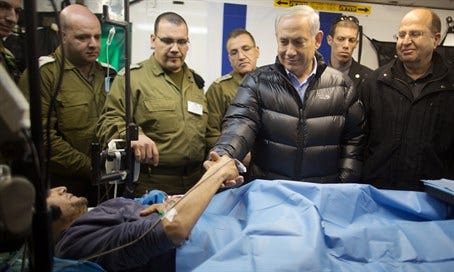Four years ago, when Donald Trump was elected President, many of you were shocked. Many wondered, “Where did we go wrong?” Today, I interview author and journalist Max Blumenthal about his book Management of Savagery. Max painstakingly details the foreign policy decisions made during the cold war in the 1970s, and maps the ripple effects of these decisions that has lead us to this path of regime change wars, empire, Islamophobia and bloodstained episodes of blowback.
Excerpt from Management of Savagery
Israel’s ISIS Connection
While Washington’s Gulf-funded think tank experts spun out public relations for the allies of Al Qaeda, ISIS found defenders in Israel. At the Likud Party-linked Begin-Sadat Center for Strategic Studies, its director Efraim Inbar promoted the IslamicState in Syria as a boon to Israel’s strategic deterrence. In an op-ed entitled “The Destruction of Islamic State Is a Strategic Mistake,” Inbar argued, “The West should seek the further weakening of Islamic State, but not its destruction.”
Instead, he insisted, it should exploit ISIS as a “useful tool” in the fight against Israel’s true enemy, Iran and its proxy, Hezbollah, which operates on Israeli frontiers from southern Lebanon. “A weak IS is, counterintuitively, preferable to a destroyed IS,” Inbar concluded. Inbar went on to argue for prolonging the conflict in Syria for as long as possible on the grounds that extended sectarian bloodshed would produce “positive change.”
As bracing as it might have been, Inbar’s argument provided a perfect distillation of the Israeli government’s position on the Syrian civil war. “In Syria, if the choice is between Iran and the Islamic State, I choose the Islamic State,” Israel’s former defense minister, Moshe Ya’alon, bluntly stated in 2016. Eager to see an Iranian ally weakened from within and without, the Israeli army occasionally bombed in support of the rebels operating around the southern city of Quneitra and attacked Damascus several times.
The end goal of the Israelis was to establish a buffer zone between itself and Hezbollah, with Sunni Islamists, including Al Qaeda affiliates, acting as its proxies. A rebel commander revealed to the US news outlet Al-Monitor,“The battle to capture Quneitra on Sept. 27 [2014] was preceded by coordination and communications between Abu Dardaa, a leader of Jabhat al-Nusra [Al Qaeda], and the Israeli army to pave the way for the attack.”

Benjamin Netanyahu greeting injured Rebel Fighter
The Israeli military-intelligence apparatus even funded its own unit of the Free Syrian Army, the Golan Knights. “Israel stood by our side in a heroic way,” Moatasem al-Golani, a spokesman for the Golan Knights, told the Wall Street Journal,“We wouldn’t have survived without Israel’s assistance.”
In 2016, Israel established a liaison unit to support the efforts of the rebels in southern Syria, according to journalist Nour Samaha, “facilitating cross-border travel for residents into Israel, regular deliveries of food, clothing, construction equipment and educational materials, airstrikes on pro-government positions and the establishment of an Israeli-backed opposition faction in rebel-held southern Syria.”
When journalist Bryan Bender visited top Israeli military officials in the occupied Golan Heights, he heard unapologetic arguments for supporting Al Qaeda and ISIS against the Syrian government, Iran and Hezbollah. “If I can be frank, the radical axis headed by Iran is more risky than the global jihad one,” said Army Brigadier General Ram Yavne, the head of the IDF’s Strategic Division. “It is much more knowledgeable, stronger, with a bigger arsenal.” When Bender asked another Israeli official if the United States should allow ISIS to maintain its caliphate in eastern Syria, he replied, “Why not?”
While Israeli military honchos took satisfaction from the bloodshed of Syria’s civil war, ISIS commanders tiptoed around the Israeli military. During a public forum in Israel, the ever-candid former minister of defense, Ya’alon, revealed that an ISIS cell operating alongside the rebels in southern Syria had accidentally launched a mortar into Israeli-controlled territory. “On most occasions, firing comes from regions under the control of the regime,” Ya’alon commented. “But once the firing came from ISIS positions—and it immediately apologized.”
Pushed by Israeli media to clarify his statement about ISIS formally apologizing to Israel—an open admission of an Israeli backchannel to the jihadists—Ya’alon refused further comment.
In Washington, meanwhile, top officials in the Obama administration, including Hillary Clinton, kept their complaints about the channels of state support to ISIS and other jihadist rebel factions confined to private discussions. There was a lot to lose in venting their frustrations in public, including the massive donations their own political operations received from the very same sources.
When Hillary Clinton left the State Department in late 2013, she immediately joined the board of the Clinton Foundation. The New York-based nonprofit touted its charitable good works around the world, from making AIDS medication more affordable to “working toward a world where more girls and women can achieve full participation in all aspects of life.” At the same time, the Clinton Foundation raked in between $10 and $25 million from the government of Saudi Arabia, and as much as $5 million from a front group called “Friends of Saudi Arabia.” Tens of millions more flowed into the Clinton foundation coffers from Qatar, Kuwait and the United Arab Emirates.
All along, Clinton knew that the major donors to her family’s vehicle for charity and influence peddling—a key platform for her forthcoming presidential campaign—were propping up ISIS and Al Qaeda in Syria. In a 2014 email to her longtime political confidant John Podesta, Clinton singled out Qatar and Saudi Arabia as the principal benefactors of the Islamic State. “While this military/para-military operation is moving forward,” she wrote, citing Western and US intelligence sources, “we need to use our diplomatic and more traditional intelligence assets to bring pressure on the governments of Qatar and Saudi Arabia, which are providing clandestine financial and logistic support to ISIL and other radical Sunni groups in the region.”
Vice President Joseph Biden was even more explicit. Discussing the challenges facing America in Syria, he stated, “Our biggest problem is our allies.” Singling out Turkey and Saudi Arabia, Biden complained at Harvard’s Kennedy School of Government in October 2014, “They were so determined to take down Assad and essentially have a proxy Sunni–Shia war; what did they do? They poured hundreds of millions of dollars and thousands of tons of weapons into anyone who would fight against Assad. Except that the people who were being supplied were Al-Nusra and Al Qaeda and the extremist elements of jihadis coming from other parts of the world.”
Biden’s candid comments were immediately labeled as a “gaffe” by the Washington Post’s Adam Taylor, who grumbled about the “worrying habit of lumping al-Qaeda’s al-Nusra Front in with Islamic State.” For daring to give credence to what was already widely known, Biden was forced to embark on the equivalent of an international apology tour the same month, issuing “a formal clarification” to Turkey’s Erdoğan and thanking Saudi Arabia’s foreign minister for his country’s supposed cooperation in the fight against ISIS. After Biden’s pathetic retreat, scarcely anyone in Washington, whether in government, the world of think tank experts, or in the press corps, dared to openly confront America’s core Middle Eastern allies for their backing of Al Qaeda and ISIS.
Besides Saudi Arabia and Qatar, there was ample evidence that Turkey was taking a lead role in fueling Islamist militancy in Syria’s north. A leaked 2015 report from the Turkish Gendarmerie General Command found that lorries filled with heavy weapons had been sent by the Turkish intelligence services to resupply al-Nusra. “The trucks were carrying weapons and supplies to the al-Qaeda terror organization,” the report read. The government of Turkish president Erdoğan promptly banned all media coverage of the scandal and placed the soldiers who carried out the searches on trial for espionage.
A twenty-nine-year-old Lebanese American named Serena Shim had been reporting on these developments on the Turkish border for Press TV, the Iranian government’s English language channel. She was among the first correspondents to cover the transfer of arms from the Incirlik US air base in Turkey to insurgents in Syria. Her sister, Fatmeh, told local media in her hometown of Detroit, Michigan, that Shim “caught [Turkish intelligence] bringing ISIS high-ranked members into Syria from Turkey into camps, which are supposed to be Syrian refugee camps.” Shim began to fear for her life, complaining that Turkish intelligence considered her a spy. “I’m hoping that nothing is going to happen, that it’s going to blow over,” she told Press TV, the Iranian network, on October 18.

Turkey-backed FSA capture the city of Afrin in Syria.
One day later, Shim died in a car accident. The story of her death was buried, with no acknowledgement from Reporters Without Borders or the Committee to Protect Journalists. American media scarcely covered it at all. Press TV said the car that she died in and its driver had disappeared. Her family never accepted the official version of events and has pressed in vain for an investigation….
If you enjoyed this excerpt:
Max Blumenthal is the host of the show Moderate Rebels and also the editor of The Gray Zone.











